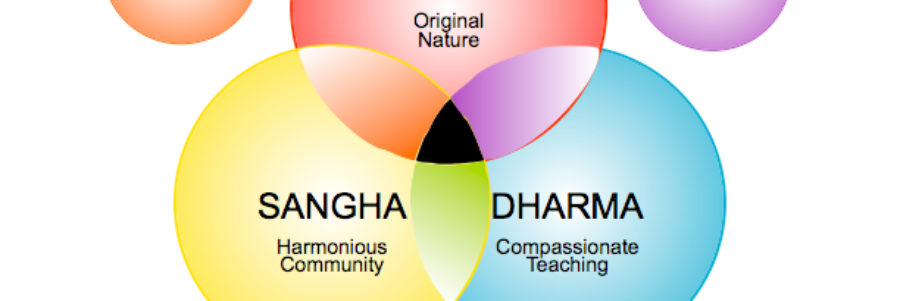Appreciation and Recognition in Zen

We all appreciate being recognized for what we do, as a senior student recently reminded me. In ordinary walks of life, expressions of appreciation are often in the form of money, such as getting that promotion, and/or a raise. Sometimes, in business, we get a “sideways” promotion—meaning additional duties, but no additional compensation. More prestige and status, perhaps. Often, appreciation is expressed in the form of gifts, as during the holiday season. As with gift-giving, such expressions can get out of hand.
As a cultural phenomenon, gift-giving is an ancient custom, and has historically had many different functions in the development of society, such as broadcasting to all who is the most prosperous, and can afford to be most generous. These undertones tend to reinforce unconscious memes, and underpinning economics. The requisite new car for the sixteenth birthday comes to mind.
In order to overcome self-absorption, ironically, one has to practice self-absorption, but in a very conscious and physical way. “To study the Way is to study the self” according to Master Dogen.
Zenkai taiun michael elliston, roshi
Simple expressions of appreciation and recognition for one’s efforts (in the form of a kind word said), or praise for one’s effect upon the community, represent a natural sharing of needs and comity between people. But they, too, can become a divisive force when carried to an extreme. Such as when the major donors to a church are singled out for public acknowledgement, presentation of plaques and other awards, or naming whole buildings or campuses for the great benefactors. Most others will not be so recognized.
In our Buddhist meal verses, we mention the “four benefactors” along with the Three Treasures, and all the beings in the Six Realms, in dedicating the meal. The four are variously defined as the leaders of government; our teachers; our parents; and the good friends we have in the community (sangha), including all sentient beings; who contribute to our lives to one degree or another. Of course, in the real world, some of these may not always be benign or beneficent, but in most cases, we owe a debt of gratitude to them for our safety and well-being, or in the case of parents, for our very birth.
This human birth is considered a great gift, a great opportunity in Buddhism. It forms the necessary condition of existence for awakening to the Buddhist truth. Other sentient beings are not blessed—or cursed—with the kind of self-awareness of the human being, nor with the sense of something yet missing, something beyond what our sensory awareness tells us is reality. The human mind has evolved to the level of being able to become aware, all too painfully, of its own limitations. Buddhism holds out the hope that we can transcend these limitation, as we believe all the Ancestors and Buddhas have found, in their meditation.
The aspiration in Zen, then, is to overcome self-absorption self-centeredness, and self-serving tendencies. So it is natural to interpret this intention in a social context, as in Do good for others, one way the third Pure Precept is often expressed (following Do no harm and Do only good). Thus, it is easy to misconstrue Buddhist teaching as social etiquette, and its praxis as socializing oneself to fit into the community in a harmonious manner.
But this would amount to a distortion of the central thrust of Buddhist training, especially that of Zen. In order to overcome self-absorption, ironically, one has to practice self-absorption, but in a very conscious and physical way. “To study the Way is to study the self” according to Master Dogen. So the (Buddhist) Way and the Self cannot be separated from the beginning. The self in which we can be absorbed, according to this model, is a false self. Only by thoroughly and unhesitatingly examining this so-called self can we see through it to its underlying falseness. Most of what we consider the self is a social construct that is defined by its relation to others—parents, children, lovers and friends.
We are, necessarily because physiologically, self-centered. The axis of my being runs vertically from the crown of the skull through the spinal column, as does yours. In spite of claims of out-of-body experiences, this is the fundamental “point-zero” of the spacetime grid for each of us. The only way to transcend this centeredness is through death, or the death-on-the-cushion of Samadhi, the so-called centered state. When one becomes completely centered, then there can be no center. When all that is peripheral or circumstantial has been assimilated into balance, centeredness, there can be no separation of center and peripheral, no inner and outer. This is the meaning of the still point in Zen.
This is not to deny the separateness of the many, as a relative matter. The Sun is perfectly still, relative to itself, at its centermost point, but meanwhile is careening around the center of the Milky Way. The Earth is rotating about the Sun while spinning on its axis, precessing in a dizzying dance of nutation. But at its center, it is still, relative to itself, and the sun is moving about it, from its vantage point. The Moon, likewise, is in stillness at its own center, though it is giddily circling the Earth, and in thrall to the Sun as well.
All beings, sentient and insentient, are self-centered in this way. But when in the natural state of Samadhi, this center is not separable from the effects, causes and conditions, of all forces acting upon them from without. And to itself, it is the center of the known universe.
Self-serving, as a delusion, is not immune to the blandishments of community, or Sangha. Nor to its seductions. We can see ourselves as totally dedicated to Sangha, when in fact it may be that the Sangha is flattering us into so thinking, for example, by their expressions of appreciation, respect, even adulation, or reverence. Zen priests are often addressed as “Reverend” or even “Venerable.” So to come to a point in our practice where, as Disciples or Priests of Zen, we are truly serving the Sangha, is no mean feat. It requires, again, an unforgiving assessment of our own practice of self-awareness.
So this gets to the heart of the matter, I believe. The relationship of Self and Other in Zen. “To study the Way is to study the self” as Master Dogen reminds us. There can be no separation of the Buddhist Way and the self. This is very different from science, which attempts to describe reality, or other, independent of the observer. And it differs from religion, in that this self is not assumed to be real, in the sense of a spirit or soul, which survives death. Zen practice, then, is neither selfish nor selfless, in the final analysis.
In one sense—the conventional one—expressing appreciation or recognition for the efforts of others on behalf of Zen, Buddhism, Dharma, or Sangha, is appropriate. In another, the absolute sense, it is not, actually. If we are in this for ourselves, there is certainly no need for anyone to express appreciation for what we do in pursuit of self-reward or salvation. If we are in it only for the sake of others, there may seem to be more reason for gratitude, but it is transparent that this is a misconception—there is no way to be totally dedicated to the salvation of others without including oneself into the mix. It smacks of a certain, self-serving disingenuousness, that one should see one’s own actions in that way. “To study the self is to forget the self” as Master Dogen goes on to say. If we see ourselves as the Bodhisattva dedicated completely to the salvation of others, and self-sacrificing into the bargain, how can this be construed as forgetting the self?
“To forget the self is to be enlightened by all things” holds the clue to resolving this apparent dilemma. If we do completely immerse ourselves in the study of the self—if we become able, as Matsuoka Roshi often said, to “Put your whole self into this simple act of sitting”—then we may open the door to being enlightened by all things. Note that this implies that we are not self-enlightened, or enlightened by the self alone. But since the self is one of the “all things,” it cannot be left out of the equation. Thus we discover the “true self” through being enlightened by all things, and true self includes the false self.
“To be enlightened by all things is to remove the barrier between self and other” (and go on in traceless enlightenment forever) seems to point to some social bridge between self and others, but again, this is our acculturated reading of it. Master Dogen’s true meaning, I believe, is at once more personal and less social than that.
The fundamental problem with the self, being self-centered to the point of paranoia or other pathology, is that we have in essence invented this selfsame self, based on interpretations of perceptual evidence accumulated since birth. We created this basic bifurcation of reality into self-and-other. It is at the heart of our sense of alienation, and its resultant anxiety in coming to terms with others—and more centrally, with existence itself. If we feel that we are indeed alone, and must face the overwhelming uncertainty of this existence in the context of both life and death, it is natural that we would cling to less foreboding interpretations of the practice that Zen prescribes. “Zazen is hard work.”
What it is that we truly have to be thankful for, in Buddhism, is zazen, a compassionate and unblinking confrontation with the true condition of our existence. This is a situation that we share with all sentient beings, which may offer some cold comfort. But to turn to a driven study of Dharma, or a compulsive need for Sangha, in the light of the difficult practice of “directly transmitted, straightforward buddhadharma,” as Master Dogen defines it in Jijuyu Zammai; Self-Fulfilling Samadhi, is to reject the very wish-granting jewel that Buddhism offers to sail through this world of Samsara, this ocean of suffering.
This Mani Jewel of Buddhism is the Original Nature, the Buddha Nature—fully awake in the midst of Samsara, through sitting in upright Samadhi. This experience beyond experience, accessible to all human beings, is the true Treasure of Buddhism, and that for which we should be eternally grateful. The Three Treasures thank you, I am sure, is the traditional way of expressing this. It is not for me that you practice, it is not for you that I do so. We repay our debt to Buddha, one might say, but we do not really do anything worthy of praise in our exercise of Buddha practice, Dharma study, or Sangha service. The merit, already completely present, cannot be increased or diminished by our efforts.









